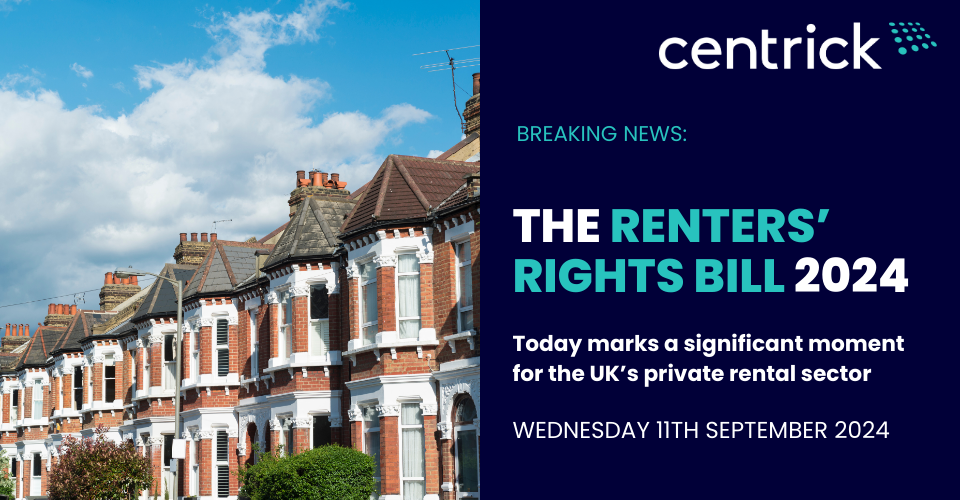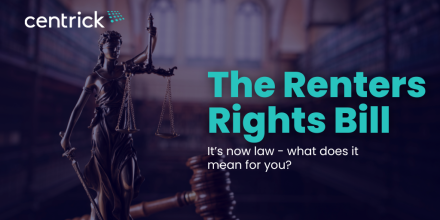Today marks a significant moment for the UK’s private rental sector as the Renters’ Rights Bill is introduced to Parliament, ushering in the most sweeping changes to tenant protections in over 30 years. With over 11 million renters set to benefit, the Bill promises a dramatic rebalancing of the landlord-tenant relationship, addressing long-standing concerns about housing insecurity, substandard living conditions, and affordability. In this blog, Centrick explores how these reforms will impact tenants and landlords alike, and what this could mean for the broader UK rental market.
Ending No-Fault Evictions: The Abolition of Section 21
One of the headline measures of the Renters’ Rights Bill is the abolition of Section 21 no-fault evictions. This long-criticised legal provision allowed landlords to evict tenants without needing to provide a reason, and whilst Section 21 was used by responsible landlords well on many occasions – it also left many renters vulnerable to retaliatory evictions and forced moves. Under the new Bill, tenants will no longer have to fear eviction without cause, ensuring greater stability and enabling them to challenge poor property conditions or unfair practices without the looming threat of sudden displacement. This reform applies to both new and existing tenancies, which gives renters immediate security across the board.
For landlords whether institutional or single property owners this change means that future eviction proceedings will need to be justified by legally defined reasons, such as tenant misconduct or a landlord’s intent to sell the property. As a result, this could slow down the ability of landlords to regain possession of their properties, but proponents of the Bill argue that it will encourage better tenant-landlord relationships and promote long-term stability within rental agreements.
Addressing Substandard Housing: Awaab’s Law and the Decent Homes Standard
Another pivotal feature of the Renters’ Rights Bill is the extension of Awaab’s Law into the private rented sector. Named after Awaab Ishak, a toddler who tragically died in 2020 due to prolonged exposure to mould in his family’s rented home, this legislation aims to prevent similar incidents by mandating stricter timelines for landlords to address severe hazards. Until now, Awaab’s Law applied only to social housing providers. Its inclusion in the private sector signals a growing recognition of the sometimes poor conditions that renters face, particularly in lower-quality private housing. Alongside Awaab’s Law, the Bill introduces the Decent Homes Standard to the private rented sector for the first time. Historically, this standard only applied to social housing, but with over 500,000 private rented homes currently failing to meet basic safety requirements, this reform seeks to elevate housing conditions nationwide. Private landlords will now face fines of up to £7,000 for failing to address hazards, a move expected to improve the quality of rental properties significantly
Tackling Rent Increases and Bidding Wars
Renters across the UK have struggled with escalating housing costs, as rent prices have soared to record highs in recent years. The Renters’ Rights Bill takes aim at this issue by banning bidding wars, a practice in which tenants compete against each other by offering higher rents than the listed price. Landlords and letting agents will now be legally required to publish a set asking price, preventing them from soliciting higher offers. It remains to be seen whether this measure will have the desired impact on the rising burden of rent across the UK. Additionally, the Bill will cap rent increases by limiting landlords to one rent rise per year, and only to the market rate. In-tenancy rent increases written into contracts—a method often used to price tenants out of their homes—will also be outlawed. These measures are designed to combat “economic evictions,” where tenants are priced out of their homes through unaffordable rent hikes. While tenant advocacy groups have praised these steps, many are calling for further protections, such as rent controls, to ensure that housing remains affordable amid the ongoing cost-of-living crisis.
Equal Access to Housing: Ending Blanket Bans
In a further bid to create a fairer housing market, the Renters’ Rights Bill will abolish blanket bans on tenants with children or those receiving benefits. These discriminatory practices have long limited housing options for vulnerable groups, forcing them into substandard accommodations or lengthy housing searches. The new legislation will ensure that landlords and letting agents can no longer legally impose such restrictions, promoting inclusivity and equal access to housing.
A Modernised Rental Market
To support these reforms, the Bill also introduces a new Private Rented Sector Database, which will allow tenants to access vital information about potential landlords and properties whilst also ensuring landlords fully understand their legal obligations. This transparency aims to hold landlords accountable for maintaining proper standards and will enable local councils to better focus their enforcement efforts on those who consistently fail to comply with regulations. The government has also committed to ensuring that homes in the private rented sector meet minimum energy efficiency standards by 2030, marking another step in the broader push toward sustainable housing. Although full details of these requirements will follow after further consultation, landlords are advised to begin considering necessary upgrades sooner rather than later
Preparing for Change
For landlords of all types, the final introduction of the Renters’ Rights Bill after its multiple readings and consultations may seem daunting, especially given the extensive adjustments required. With sources suggesting that over 4.5 million tenancy agreements will need to be updated, both landlords and letting agents will need to undertake additional training to navigate the new legal landscape. Mortgage providers and insurers are also expected to review and potentially revise their policies in response to the reforms.
However, it’s important to note that most of these changes are designed to target the minority of unscrupulous landlords who exploit the housing crisis. For the vast majority of responsible landlords, the Bill offers an opportunity to foster more transparent and equitable relationships with tenants, ultimately creating a more stable and reputable rental market.
Conclusion
The Renters’ Rights Bill represents a landmark moment for the UK’s rental sector. With the abolition of no-fault evictions, the extension of Awaab’s Law, and new protections against rent increases and discrimination, the Bill promises to provide renters with much-needed security and stability. For landlords, these changes may require significant adjustments, but they also offer a chance to participate in creating a fairer and more sustainable rental market. As the Bill progresses through Parliament, both tenants and landlords will need to stay informed and prepared for the changes that lie ahead.









